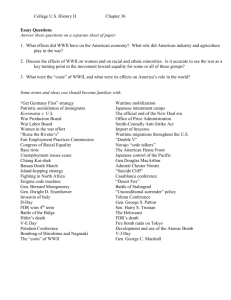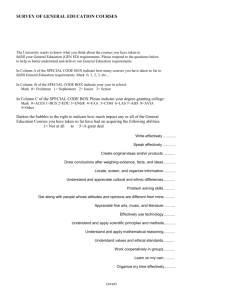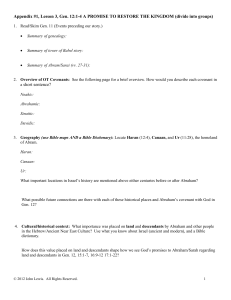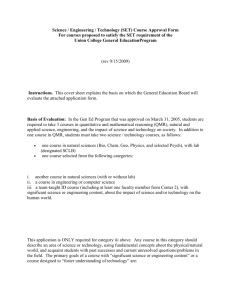Agape Bible Study - Exodus Lesson 1 Handouts
advertisement
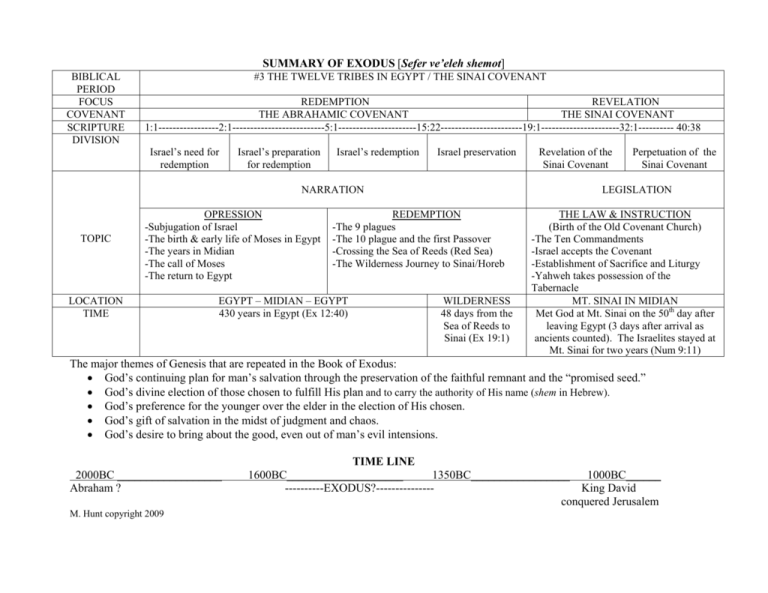
SUMMARY OF EXODUS [Sefer ve’eleh shemot] BIBLICAL PERIOD FOCUS COVENANT SCRIPTURE DIVISION #3 THE TWELVE TRIBES IN EGYPT / THE SINAI COVENANT REDEMPTION REVELATION THE ABRAHAMIC COVENANT THE SINAI COVENANT 1:1-----------------2:1--------------------------5:1----------------------15:22-----------------------19:1----------------------32:1---------- 40:38 Israel’s need for redemption Israel’s preparation for redemption Israel’s redemption Israel preservation NARRATION TOPIC OPRESSION -Subjugation of Israel -The birth & early life of Moses in Egypt -The years in Midian -The call of Moses -The return to Egypt LOCATION TIME Perpetuation of the Sinai Covenant LEGISLATION REDEMPTION -The 9 plagues -The 10 plague and the first Passover -Crossing the Sea of Reeds (Red Sea) -The Wilderness Journey to Sinai/Horeb EGYPT – MIDIAN – EGYPT 430 years in Egypt (Ex 12:40) Revelation of the Sinai Covenant WILDERNESS 48 days from the Sea of Reeds to Sinai (Ex 19:1) THE LAW & INSTRUCTION (Birth of the Old Covenant Church) -The Ten Commandments -Israel accepts the Covenant -Establishment of Sacrifice and Liturgy -Yahweh takes possession of the Tabernacle MT. SINAI IN MIDIAN Met God at Mt. Sinai on the 50th day after leaving Egypt (3 days after arrival as ancients counted). The Israelites stayed at Mt. Sinai for two years (Num 9:11) The major themes of Genesis that are repeated in the Book of Exodus: • God’s continuing plan for man’s salvation through the preservation of the faithful remnant and the “promised seed.” • God’s divine election of those chosen to fulfill His plan and to carry the authority of His name (shem in Hebrew). • God’s preference for the younger over the elder in the election of His chosen. • God’s gift of salvation in the midst of judgment and chaos. • God’s desire to bring about the good, even out of man’s evil intensions. 2000BC __________________ Abraham ? M. Hunt copyright 2009 TIME LINE 1600BC____________________ 1350BC_________________ 1000BC______ ----------EXODUS?--------------King David conquered Jerusalem Handout Exodus Lesson 1 Three narratives in Genesis relate a threat to a bride and her deliverance: Episode #1: Sarah’s abduction by Pharaoh (Gen 12:10-20) Episode #2: Sarah’s abduction by King Abimelech of Gerar (Gen 20:1-18) Episode #3: Rebekah’s thwarted abduction by King Abimelech (Gen 26:1, 7-17) These three episodes point to a fourth more significant event in salvation history: the deliverance of the children of Israel from bondage in Egypt. A three times repetition usually points to a fourth event that is significant in God’s plan of salvation. Each story has 5 elements, including the story of the Exodus experience: 1. A migration (Gen 12:10; 20:1; 26:1; Ex 46:6-7) 2. An abduction or threatened abduction (Gen 12:15; 20:2; 26:8-10; Ex 1:8-14) 3. God’s intervention (Gen 12:17; 20:3-7; 26:2-5; Ex 3:7-10) 4. A deliverance (Gen 12:19; 20:14; 26:11; Ex 12:29-14:31) 5. A conclusion (Gen 12:20; 20:15-18; 26:12-14; Ex 15-21) Abraham and Sarah’s Sojourn in and Redemption from Egypt (Gen 12:10-13:2) Gen 12:10: There was a famine in the country, and Abram went down to Egypt The Children of Israel’s Sojourn in and Redemption from Egypt (Gen 42:5; Exodus 1:11, 16; 11:1-12:38) Gen 42:5: Thus the sons of Israel were among the other people who came to get supplies, there being famine in Canaan Gen 12:12: they will kill me but leave you alive Ex 1:16: If it is a boy, kill him; if a girl, let her live Gen 12: 15: the woman was taken into Pharaoh’s household Ex 1:11: they put taskmasters over the Israelites to wear them down by forced labor Gen 12:17: Yahweh inflicted severe plagues on Pharaoh and his household Ex 11:1: Yahweh then said to Moses, ‘I shall inflict one more plague on Pharaoh and Egypt Gen 12:18: Pharaoh summoned Abram and said Gen 12:19b: Take her and go! Ex 12:31a: Pharaoh summoned Moses and said Gen 12:20: Pharaoh gave his people orders about him; they send him on his way with his wife and all his possessions Ex 12:33: The Egyptians urged the people on and hurried them out of the country… Gen 13:1: From Egypt Abram returned to the Negeb with his wife and all he possessed Ex 12:37: The Israelites left Rameses for Succoth [..]. Gen 13:1: and Lot with him Ex 12:38: A mixed crowd of people went with them Gen 12:16: And Abram … received flocks, oxen, donkeys, men and women slaves, shedonkeys and camels. 13:2: Abram was very rich with livestock, silver, and gold Ex 12:35, 38: The Israelites did as Moses had told them and asked the Egyptians for silver and golden jewelry and clothing. [..]. … and flocks and herds, quantities of livestock. Ex 12:32: And take your flocks and herds as you have asked, and go! M. Hunt © copyright 2009 www.agapebiblestudy.com Handout 3: Exodus Lesson 1 If once accepts the oral tradition that places Abraham in Canaan c. 2000 BC, and using the dates for his death, as well as the deaths of his heirs who inherited the covenant promises, together with the prophecy of the return in the fourth generation from Abraham after 430 years in Egypt, the date for the migration into Egypt was in the 18th century BC, the Exodus in the mid 1300’s and the and the conquest appears to have occurred forty years later in the late 1300’s: • 2000 BC, Abraham in Canaan • Abraham was 100 years old and lived in Canaan 75 years when Isaac was born (Gen 21:5) in 1975 BC • Abraham died when he was 175 years old (Gen 25:7) in 1900 BC • Isaac married when he was 40 years old (Gen 25:20) in 1935 BC • Isaac was 60 when his son Jacob was born (Gen 25:26) in 1915 BC • Isaac was 75 when Abraham died in 1900. • Isaac died when he was 180 years old (Gen 35:28) in 1795 BC • Jacob lived to be 147 years old (Gen 47:28); he spent the last seventeen years of his life in Egypt (Gen 47:28), therefore, the migration into Egypt occurred in 1785 BC when Jacob was 130 years old (Gen 47:9). • Jacob died in 1768 BC • Joseph became a slave in Egypt when he was 17 years old (Gen 37:2). He was thirty when he became Vizier (Gen 41:46) and eight years later was the first year of the 7-year famine when he was 38 years old. His family came into Egypt in the second year of the famine when Joseph was 40 years old, with five remaining years of famine to come (Gen 45:6). Joseph died when he was 110 years old (Gen 50:26) in 1635 BC. • If the Israelites were in Egypt for 430 years (Ex 12:20), then the Exodus occurred in approximately 1355 BC. New themes introduced in the Book of Exodus: • The children of Israel’s physical and spiritual journey in becoming a holy nation. • The children of Israel’s gift of a fuller revelation of God, who shares with them His covenant name and establishes a relationship with Israel, expressed as a covenant union with Israel as Bride of Yahweh and a covenant treaty between Israel as a vassal nation of God the Great King. • The concept of fully defined worship (sacrifice), prayer, and praise as an exercise in holiness by an entire people. • The birth of the old covenant Church—the only community (Church) unified in a unique covenant bond with the God of Creation who is the God of their fathers. As in the study of Genesis, there are certain key Hebrew words that express the various themes in Exodus and reoccur to unify the book: abad (serve/worship), ‘es (fire), kabod (connoting heaviness, glory, wealth and firmness), yad / yamin (hand-arm/ right hand), zeroa (arm), and shem (name), and yada’ (knowing/knowledge). www.AgapeBibleStudy.com


